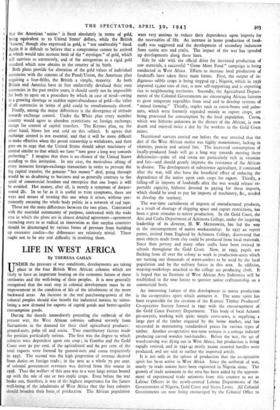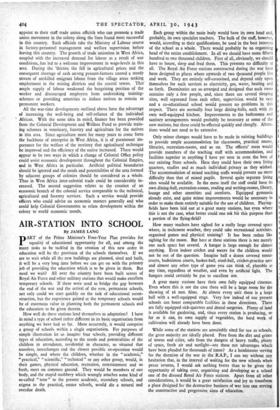LIFE IN WEST AFRICA
By THERESA CAHAN
UNDER the pressure of war conditions, developments are taking place in the four British West African colonies which are likely to have an important bearing on the economic future of these territories and the well-being of their peoples. It is now generally recognised that the next step in colonial development must be an improvement in the condition of life of the inhabitants of the more backward areas. An increase in the real purchasing-power of the colonial peoples should also benefit the industrial nations by stimu- lating a new demand for exports of capital goods and better-quality consumption goods.
During the decade immediately preceding the outbreak of the present war, the West African colonies suffered severely from fluctuations in the demand for their chief agricultural products: ground-nuts, palm oil and cocoa. Two contributory factors made the position particularly serious. The first was the degree to which colonies were dependent upon one crop ; in Gambia and the Gold Coast over 90 per cent. of the agricultural and 6o per cent, of the total exports were formed by ground-nuts and cocoa respectively in 1937. The second was the high proportion of revenue derived from duties on foreign trade ; in the area as a whole 70 per cent. of colonial government revenues was derived from this source in 1938. Thus the welfare of this area was to a very large extent bound up with the sale of one or two staple crops. Even before the war broke out, therefore, it was of the highest importance for the future well-being of the inhabitants of West Africa that the four colonies should broaden their basis of production. The African population were very anxious to reduce their dependence upon imports for the necessaries of life. An increase in home production of food- stuffs was suggested and the development of secondary industries from native arts and crafts. The impact of the war has speeded up developments along these lines.
Side by side with the official drive for increased production of raw materials, a successful "Grow More Food" campaign is being conducted in West Africa. Efforts to increase local production of foodstuffs have taken three main forms. First, the output of in- digenous edible crops is being stepped up ; Nigeria, which in 1930 imported 15,000 tons of rice, is now self-supporting and is exporting rice to neighbouring territories. Secondly, the Agricultural Depart- ments of the Colonial Governments are encouraging African farmers to grow temperate vegetables from seed and to develop systems of " mixed farming." Thirdly, staples such as cocoa-beans and palm- nuts, which were formerly regarded mainly as export crops, are being processed for consumption by the local population. Cocoa, which was hitherto unknown in the dietary of the African, is now drunk and enjoyed twice a day by the workers in the Gold Coast mines.
Nutritional surveys carried out before the war revealed that the diet of the West African native was highly monotonous, lacking in vitamins, protein and animal fats. The increased consumption of locally-produced foods will go a long way towards meeting these deficiencies—palm oil and cocoa are particularly rich in vitamins and fats—and should greatly improve the resistance of the African to disease. The development of subsistence agriculture, if continued after the war, will also have the beneficial effect of reducing the dependence of the native upon cash crops for export. Thirdly, a falling-off in imports of foodstuffs after the war would release ex- portable capacity, hitherto devoted to paying for these imports, which should be used to pay for imports of machinery, &c., needed to develop the territory.
The war-time curtailment of imports of manufactured products, as a result of shortage of shipping space and export restrictions, has been a great stimulus to native production. In the Gold Coast, the Arts and Crafts Department of Achimota College, under the inspiring leadership of its director, H. W. Meyerowitz, has led the way in the encouragement of native workmanship. In 1937 an expert potter, invited from England by Achimota College, discovered that most objects made from clay could be produced from local materials. Since then pottery and many other crafts have been revived in schools throughout the Gold Coast. Now, in 1943, pupils are flocking from all over the colony to work in production-units which are turning out thousands of water-coolers to be used by the local population and by the military forces in this area. In addition, weaving-workshops attached to the college are producing cloth. It is hoped that an Institute of West African Arts Industries will be established in the near future to sponsor native craftsmanship on a commercial basis.
An interesting feature of this development in native production is the co-operative spirit which animates it. The same spirit has been responsible for the creation of the Kumasi Timber Producers' Co-operative Society formed in 1941 with the encouragement of the Gold Coast Forestry Department. This body of local Ashanti pit-sawyers, working with quite simple cross-saws, is supplying a large part of the timber required by the home market, and has succeeded in maintaining standardised prices for various types of timber. Another co-operative war-time venture is a cottage industry producing carved wooden tool-handles. Before the war, the art of wood-carving was dying out in West Africa, but production is being rapOly revived, and in 1941-4z nearly 30,000 assorted handles were produced, and are said to outlast the imported article.
It is not only in the sphere of production that the co-operative spirit has been active in West Africa. Since the outbreak of war, nearly 70 trade unions have been registered in Nigeria alone. The growth of trade unionism in the area has been aided by the appoint- ment of experienced trade unionists from this country to act as Labour Officers in the newly-created Labour Departments of the Governments of Nigeria, Gold Coast and Sierra Leone. All Colonial Governments are now being encouraged by the Colonial Office to appoint to their staff trade union officials who can promote a trade union movement in the colony along the lines found most successful in this country. Such officials take the Ministry of Labour course in factory-personnel management and welfare supervision before leaving this country. The growth of trade unionism in West Africa, coupled with the increased demand for labour as a result of war conditions, has led to a welcome improvement in wage-levels in this area. During the 'thirties the fall in agricultural prices and the consequent shortage of cash among peasant-farmers caused a steady stream of unskilled emigrant labour from the village areas seeking employment in the mining districts and the coastal towns. This' ample supply of labour weakened the bargaining position of the worker and discouraged employers from undertaking training- schemes or providing amenities to induce natives to remain as permanent workers.
All the war-time developments outlined above have the advantage of increasing the well-being and self-reliance of the individual ' African. With the same idea in mind, finance has been provided from the Colonial Development and Welfare Fund to provide train- ing schemes in veterinary, forestry and agriculture for the natives in this area. Since agriculture must for many years to come form the backbone of enterprise in West Africa, it is of paramount im- portance for the welfare of the territory that agricultural technique be improved and the efficiency of the native increased. There would appear to be two ways in which a change of Colonial Office policy could assist economic development throughout the Colonial Empire, and in West Africa in particular. Artificial political boundaries should be ignored and the needs and potentialities of the area formed by adjacent groups of colonies should be considered as a whole. Thus in West Africa inter-colonial trade could be considerably in- creased. The second suggestion relates to the creation of an economic branch of the colonial service comparable to the technical, agricultural and forestry services. Such a service would provide officers who could advise on economic matters generally and who could help Colonial Governments to relate development within the colony to world economic trends.























 Previous page
Previous page